

Net Nutrality & The Theft of the Commons. Net Nutrality Meme. Activism Won Net Neutrality - Can it Stop Trump's FCC from Rolling it Back? As FCC chair Ajit Pai moves ahead with his plan to undo net neutrality, watch our April 2017 interview with Craig Aaron of Free Press on how the protection of equal access to internet content depends on a resurgence of the grassroots activism that helped push it through biography Craig Aaron is the president and CEO of Free Press and the Free Press Action Fund in April 2011.
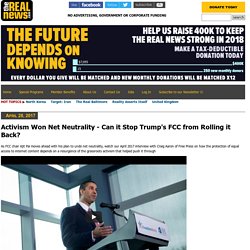
He joined Free Press in 2004 and speaks across the country on media, Internet and journalism issues. Craig is a frequent guest on talk radio and is quoted often in the national press. It’s official: the FCC has started rolling back net neutrality protections. [147] The Battle For The Net Is Now, New Study Shows Corruption & More. News. News a-l. Breaking the Cycle of Internet Repression
"If you want to liberate a society," said Egyptian Arab Spring activist Wael Ghonim, "just give them the Internet.
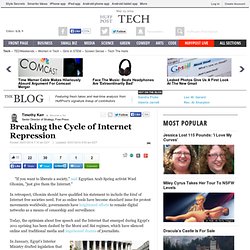
" In retrospect, Ghonim should have qualified his statement to include the kind of Internet free societies need. For as online tools have become standard issue for protest movements worldwide, governments have heightened efforts to remake digital networks as a means of censorship and surveillance. Today, the optimism about free speech and the Internet that emerged during Egypt's 2011 uprising has been dashed by the Morsi and Sisi regimes, which have silenced online and traditional media and imprisoned dozens of journalists. In January, Egypt's Interior Ministry drafted legislation that would censor websites that "instigate terrorism," according to a report in Al Sherooq Sites the Ministry singled out for monitoring include Facebook, which has become a popular channel for Egyptians to report local news, connect with a larger community and voice their dissent. 1. 2. 3. 4.
DN! Internet For the 1 Percent: New FCC Rules Strike Down Net Neutrality, Opening Fast Lanes for Fees" JUAN GONZÁLEZ: Federal regulators have unveiled new rules that would effectively abandon net neutrality, the concept of a free and open Internet.
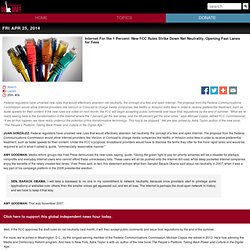
The proposal from the Federal Communications Commission would allow Internet providers like Verizon or Comcast to charge media companies like Netflix or Amazon extra fees in order to receive preferential treatment, such as faster speeds for their content. Under the FCC’s proposal, broadband providers would have to disclose the terms they offer for the more rapid lanes and would be required to act in what it called a, quote, "commercially reasonable manner. " AMY GOODMAN: Media reform groups like Free Press denounced the new rules, saying, quote, "Giving the green light to pay-for-priority schemes will be a disaster for startups, nonprofits and everyday Internet users who cannot afford these unnecessary tolls.
SEN. AMY GOODMAN: That was November 2007. Click here to support this global independent news hour today. MICHAEL COPPS: Yeah. DN! "Utopian Potential of the Internet": Astra Taylor on How to Take Back Power & Culture in Digital Age. AMY GOODMAN: "The King of Carrot Flowers, Pt. 1" by Neutral Milk Hotel, Jeff Mangum’s band.
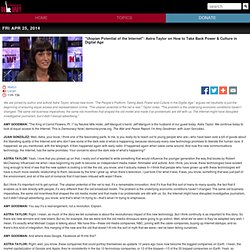
Jeff Mangum is the husband of our guest today, Astra Taylor. We continue today to look at equal access to the Internet. Could 40 Million Angry Netflix Users Help Save Net Neutrality? Popular streaming video service threatens to mobilize its customers against telecom assault on open internet (Photo/Solacetech via Flickr) The online video streaming company Netflix—which this week surpassed business world expectations by announcing a surge in viewership with paying membership close to 40 million U.S. customers—may seem like an unlikely ally to grassroots activists and progressive organizations fighting against the nation’s largest telecommunications companies in the name of an open and fair internet.
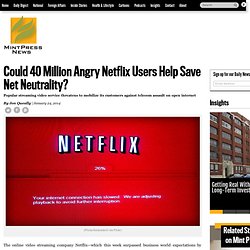
But if the company is willing to flex its political muscle or actually mobilizes its customer base as an army of citizen lobbyists, could such a development help turn the tide against a recent court decision that has imperiled the concept of net neutrality? “We would vigorously protest and encourage our members to demand the open Internet they are paying their ISP to deliver,” said Netflix CEO Reed Hastings and CFO David Wells in the letter, which continued: What's the Right Path Forward on Net Neutrality? Federal Communications Commission Chairman Tom Wheeler, left, testifies on Capitol Hill in Washington, Dec. 12, 2013.
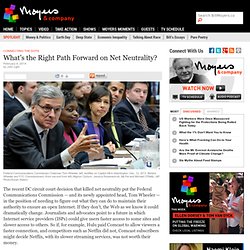
Behind Wheeler are FCC Commissioners (from second from left) Mignon Clyburn, Jessica Rosenworcel, Ajit Pai and Michael O'Rielly. (AP Photo/Susan Walsh) The recent DC circuit court decision that killed net neutrality put the Federal Communications Commission — and its newly appointed head, Tom Wheeler — in the position of needing to figure out what they can do to maintain their authority to ensure an open Internet. If they don’t, the Web as we know it could dramatically change. Journalists and advocates point to a future in which Internet service providers (ISPs) could give users faster access to some sites and slower access to others. News m-z. Moyers & Company: Is Net Neutrality Dead? New FCC proposal could be the end of net neutrality, opponents say.
The Federal Communications Commission plans to propose new rules today that would let Internet service providers charge companies to move their content through a speedier lane, a “pay for play” model that opponents say will kill net neutrality.
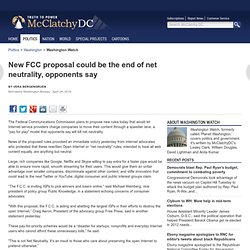
News of the proposed rules provoked an immediate outcry yesterday from Internet advocates who protested that these rewritten Open Internet or “net neutrality” rules, intended to treat all web content equally, are anything but neutral. Large, rich companies like Google, Netflix and Skype willing to pay extra for a faster pipe would be able to ensure more rapid, smooth streaming for their users. This would give them an unfair advantage over smaller companies, discriminate against other content, and stifle innovation that could lead to the next Twitter or YouTube, digital consumer and public interest groups claim. "This is not Net Neutrality.
Net Neutrality, Films for action. The World Trade Organization (WTO) held its Third Ministerial Conference in Seattle from November 30 to December 3, 1999.
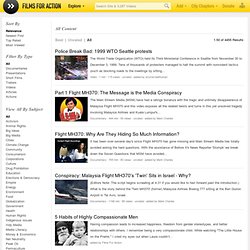
Tens of thousands of protesters managed to halt the summit with nonviolent tactics (such as blocking roads to the meetings by sitting... The Main Stream Media (MSM) have had a ratings bonanza with the tragic and untimely disappearance of Malaysia Flight MH370 and this video exposes all the related twists and turns in this yet unsolved tragedy involving Malaysia Airlines and Kuala Lumpur's... It has been over several day's since Flight MH370 has gone missing and Main Stream Media has totally avoided asking the hard questions. Net Neutrality Died With the Comcast/Netflix Deal. Do you support reporting and analysis that's free from corporate influence?
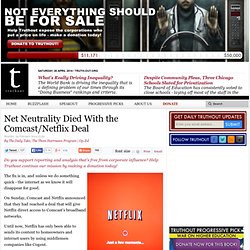
Help Truthout continue our mission by making a donation today! (Photo: John Pasden / Flickr)The fix is in, and unless we do something quick - the internet as we know it will disappear for good. On Sunday, Comcast and Netflix announced that they had reached a deal that will give Netflix direct access to Comcast's broadband networks. Until now, Netflix has only been able to sends its content to homeowners and internet users by using middlemen companies like Cogent.
Cogent, which in internet parlance is known as a "backbone provider," routs Netflix's content through to Comcast, which then sends that content to millions of homes across the country. But with its new megadeal, Netflix will get to avoid Cogent altogether and send its content straight to Comcast, and, from there, to TV fans like you and me. Sounds pretty good, right? Peering into the Soft Underbelly of Net Neutrality. The net neutrality fight is moving in new directions, and quickly.
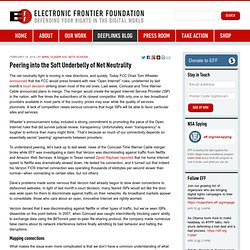
Today FCC Chair Tom Wheeler announced that the FCC would press forward with new “Open Internet” rules, undeterred by last month’s court decision striking down most of the old ones. Last week, Comcast and Time Warner Cable announced plans to merge. The merger would create the largest Internet Service Provider (ISP) in the nation, with five times the subscribers of its closest competitor. With only one or two broadband providers available in most parts of the country, prices may soar while the quality of services plummets. A lack of competition raises serious concerns that huge ISPs will be able to favor particular sites and services.
Rebooting Net Neutrality. The Federal Communications Commission has taken the first step in rebooting the net neutrality rules. Today's announcement by FCC Chairman Tom Wheeler follows a major D.C. Circuit decision this year, which struck down the existing rules requiring that Internet Service Providers (ISPs) treat all data on the internet equally, while keeping the door open for future FCC action to prevent broadband providers from discriminating against or blocking certain websites or services. Republicans Look to Kill Net Neutrality, Hand the Web to Corporations. In 2012, United States House of Representatives member Lamar S. Smith (R-TX) introduced the Stop Online Piracy Act, or SOPA. While the main goal of the bill was to deter piracy, the language was very broad and far reaching. As a result, public outrage hit a fever pitch. Yesterday, the DC Circuit Court of Appeals. The Internet Is Dead, Long Live the Internet!
(Image via Shutterstock)The internet as we know it is dead. On Tuesday, the D.C. Circuit Court of Appeals, the second most important court in the country after the Supreme Court, struck down the FCC’s Open Internet Order, the legal framework that protects net neutrality. This is nothing short of a disaster. The idea behind net neutrality is pretty simple: big corporate internet service providers, like Verizon, should have to treat all websites and all web users equally and should not be allowed to treat the internet like their own personal toll road.
They should not be allowed, for example, to run your music website at crappy speeds just because that music site could compete with a Verizon-owned music website. A Fascinating Look Inside Those 1.1 Million Open-Internet Comments : All Tech Considered. When the Federal Communications Commission asked for public comments about the issue of keeping the Internet free and open, the response was huge. So huge, in fact, that the FCC's platform for receiving comments twice got knocked offline because of high traffic, and the deadline was extended because of technical problems. So what's in those nearly 1.1 million public comments? A lot of mentions of the F word, according to a TechCrunch analysis. But now, we have a fuller picture. Friends. NetNeutrality. Net Neutrality. Internet Censorship. Media Concentration. Net Nutrality Activism. Net Nutrality and Society. Internet Freedom. Not So Free Speach, Money Talks.